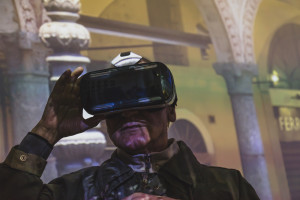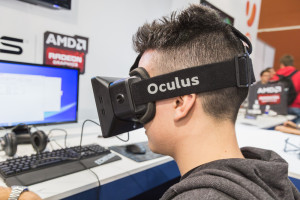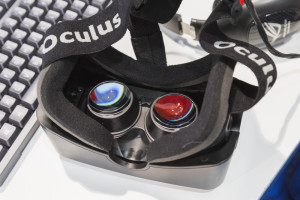Virtual Reality: The Future of Open Houses
I’m a shameless, unrepentant video gamer–and while I’m thankful I no longer have to keep that title to myself, only spoken of among trusted few in back alley Gamestops, gaming as an industry rarely gets much mainstream notice beyond Grand Theft Auto ultraviolence and Call of Duty’s absurd sales numbers (which are completely undeserved, but I digress). But while the public only sees a medium where pubescent teenage boys learn the delicate art of profanity spitting, insiders like me see a platform on the true cutting-edge of not just entertainment, but human interaction.
Gaming’s next great gift to the world: virtual reality.

It was only a couple years ago that even we gamers saw the concept of virtual reality as something of a joke. Think about how the general public regarded 3D movies pre-Avatar— no one wanted to consider that someday technology could evolve past flimsy paper glasses and Jaws 3D. When people discovered the Oculus Rift on Kickstarter, most gamers old enough to remember the horrors of devices like the Virtual Boy did not look upon the idea fondly (I get a migraine just thinking about it).
All it took to change my tune was a video of Youtube celebrity PewDiePie using the device to play horror games.
Now the Oculus Rift is still technically in beta testing, so the only “games” available to play on the thing are tech demos made by indie developers to get their feet wet with the hardware–which means they mostly look like something the original Playstation might crap out on an off day–but that doesn’t stop them from requiring the player to have at least three pairs of clean underwear on hand at all times. Walking around a haunted house with the ability to actually see where he turned his head (which was usually behind his back to see the vampire breathing down his neck) was enough to make PewDiePie more-often-than-not rip his headset off in feats of schoolgirl screams. It doesn’t matter that the vampire looks like a reject from the Plan 9 From Outer Space soundstage–the immersion is so seamless and natural that it makes even the lowest resolution images seem convincing. If even that was enough to elicit such a visceral response, imagine what the Oculus will be capable of once it has the full brunt of modern technology at its back.
It hasn’t taken long for other industries to take notice of Oculus’ vast potential beyond gaming. Facebook–not exactly known as a game publisher–certainly didn’t purchase the former Kickstarter company for a cool $2 billion to create a more immersive Farmville. According to CEO Mark Zuckerberg, “After games, we’re going to make Oculus a platform for many other experiences. Imagine enjoying a courtside seat at a game, studying in a classroom of students and teachers all over the world or consulting with a doctor face-to-face–just by putting on goggles in your home.”
Imagine the possibilities of this technology in the real estate market. Instead of fussing over h’ordeuvres and taking valuable hours of your day to sit in a property prospective buyers may or may not show up at, buyers will soon have the power to take a full tour right from their own living room. And I don’t mean watching a video with goggles–I mean a fully interactive, self-guided experience where buyers can view each room from all angles to their hearts content. No time has to be wasted by either party except the time the buyer wants to waste.
And who says we have to limit ourselves to just want is currently in the home? Particularly ambitious Oculus developers are always finding ways to implement holograms in physical spaces–holograms such as furniture. If you were wondering if your 65-inch flatscreen was going to look good hanging over your potential new home’s fireplace, you’ll soon be able to find out without having to fit the TV in your car trunk. Trouble visualizing your furniture in the new bedroom? What if you could upload a rendering of your furniture and digitally rearrange to see if it would work? My mother is an interior design fanatic, and I could see the possibility of rearranging digital furniture in a new home so enticing that she’d never take the headset off.
Beyond open houses, just imagine how real estate contractors could use this technology. What if you could hand a headset over to a client and have them tour their new house or office before it’s even built!? Things keep expanding at this rate and in a few years you’ll be sipping digital coffee with your digital agent preparing to close on your new digital home.
Since the debut of the Oculus, virtual reality has quickly emerged as one of the most rapidly expanding markets of this generation. Sony, Samsung, and Valve have all announced their own respective headset platforms–and when they hit the market it’s going to be fun watching the fireworks as each of these companies crawl over each other for dominance. But even if one of these systems proves to be “triumphant,” we as consumers have already won. These gizmos have the ability to contribute to our quality of life in all facets, and its limits are only constrained by what society will come to accept.
Oh, and yeah it’ll probably make a lot of Call of Duty gamers pretty happy too. Now if I could just invent a device to make them actually feel the bullets…
- First Impressions of Truila’s Instant Home Value Estimator - January 10, 2017
- Real Prospector Radio Show: Episode 14, Alabama and Georgia Real Estate with Regina Palmer - April 27, 2016
- Real Prospector Radio Show: Episode 13, Turning a Vacation into a Home Buying Experience with Len Giancola - April 13, 2016




